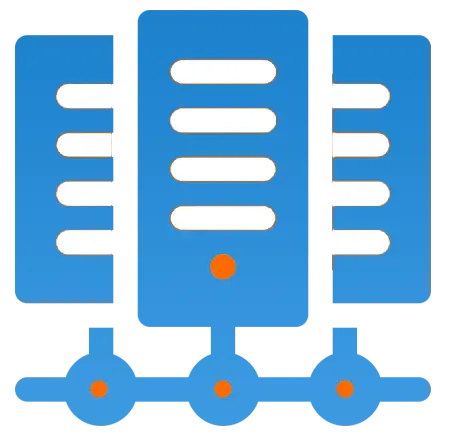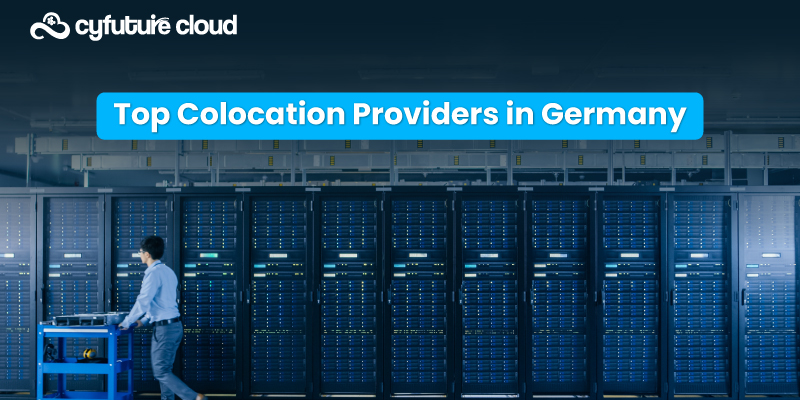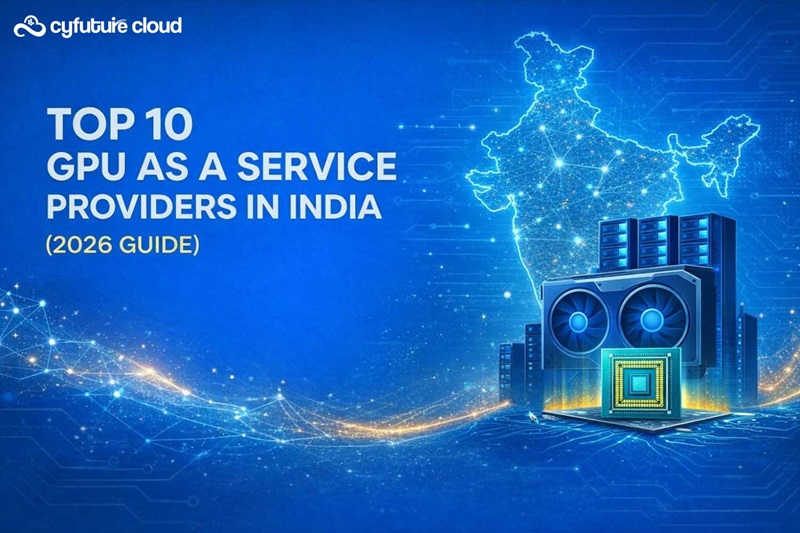Get 69% Off on Cloud Hosting : Claim Your Offer Now!
- Products
-
Compute
Compute
- Predefined TemplatesChoose from a library of predefined templates to deploy virtual machines!
- Custom TemplatesUse Cyfuture Cloud custom templates to create new VMs in a cloud computing environment
- Spot Machines/ Machines on Flex ModelAffordable compute instances suitable for batch jobs and fault-tolerant workloads.
- Shielded ComputingProtect enterprise workloads from threats like remote attacks, privilege escalation, and malicious insiders with Shielded Computing
- GPU CloudGet access to graphics processing units (GPUs) through a Cyfuture cloud infrastructure
- vAppsHost applications and services, or create a test or development environment with Cyfuture Cloud vApps, powered by VMware
- Serverless ComputingNo need to worry about provisioning or managing servers, switch to Serverless Computing with Cyfuture Cloud
- HPCHigh-Performance Computing
- BaremetalBare metal refers to a type of cloud computing service that provides access to dedicated physical servers, rather than virtualized servers.
-
Storage
Storage
- Standard StorageGet access to low-latency access to data and a high level of reliability with Cyfuture Cloud standard storage service
- Nearline StorageStore data at a lower cost without compromising on the level of availability with Nearline
- Coldline StorageStore infrequently used data at low cost with Cyfuture Cloud coldline storage
- Archival StorageStore data in a long-term, durable manner with Cyfuture Cloud archival storage service
-
Database
Database
- MS SQLStore and manage a wide range of applications with Cyfuture Cloud MS SQL
- MariaDBStore and manage data with the cloud with enhanced speed and reliability
- MongoDBNow, store and manage large amounts of data in the cloud with Cyfuture Cloud MongoDB
- Redis CacheStore and retrieve large amounts of data quickly with Cyfuture Cloud Redis Cache
-
Automation
Automation
-
Containers
Containers
- KubernetesNow deploy and manage your applications more efficiently and effectively with the Cyfuture Cloud Kubernetes service
- MicroservicesDesign a cloud application that is multilingual, easily scalable, easy to maintain and deploy, highly available, and minimizes failures using Cyfuture Cloud microservices
-
Operations
Operations
- Real-time Monitoring & Logging ServicesMonitor & track the performance of your applications with real-time monitoring & logging services offered by Cyfuture Cloud
- Infra-maintenance & OptimizationEnsure that your organization is functioning properly with Cyfuture Cloud
- Application Performance ServiceOptimize the performance of your applications over cloud with us
- Database Performance ServiceOptimize the performance of databases over the cloud with us
- Security Managed ServiceProtect your systems and data from security threats with us!
- Back-up As a ServiceStore and manage backups of data in the cloud with Cyfuture Cloud Backup as a Service
- Data Back-up & RestoreStore and manage backups of your data in the cloud with us
- Remote Back-upStore and manage backups in the cloud with remote backup service with Cyfuture Cloud
- Disaster RecoveryStore copies of your data and applications in the cloud and use them to recover in the event of a disaster with the disaster recovery service offered by us
-
Networking
Networking
- Load BalancerEnsure that applications deployed across cloud environments are available, secure, and responsive with an easy, modern approach to load balancing
- Virtual Data CenterNo need to build and maintain a physical data center. It’s time for the virtual data center
- Private LinkPrivate Link is a service offered by Cyfuture Cloud that enables businesses to securely connect their on-premises network to Cyfuture Cloud's network over a private network connection
- Private CircuitGain a high level of security and privacy with private circuits
- VPN GatewaySecurely connect your on-premises network to our network over the internet with VPN Gateway
- CDNGet high availability and performance by distributing the service spatially relative to end users with CDN
-
Media
-
Analytics
Analytics
-
Security
Security
-
Network Firewall
- DNATTranslate destination IP address when connecting from public IP address to a private IP address with DNAT
- SNATWith SNAT, allow traffic from a private network to go to the internet
- WAFProtect your applications from any malicious activity with Cyfuture Cloud WAF service
- DDoSSave your organization from DoSS attacks with Cyfuture Cloud
- IPS/ IDSMonitor and prevent your cloud-based network & infrastructure with IPS/ IDS service by Cyfuture Cloud
- Anti-Virus & Anti-MalwareProtect your cloud-based network & infrastructure with antivirus and antimalware services by Cyfuture Cloud
- Threat EmulationTest the effectiveness of cloud security system with Cyfuture Cloud threat emulation service
- SIEM & SOARMonitor and respond to security threats with SIEM & SOAR services offered by Cyfuture Cloud
- Multi-Factor AuthenticationNow provide an additional layer of security to prevent unauthorized users from accessing your cloud account, even when the password has been stolen!
- SSLSecure data transmission over web browsers with SSL service offered by Cyfuture Cloud
- Threat Detection/ Zero DayThreat detection and zero-day protection are security features that are offered by Cyfuture Cloud as a part of its security offerings
- Vulnerability AssesmentIdentify and analyze vulnerabilities and weaknesses with the Vulnerability Assessment service offered by Cyfuture Cloud
- Penetration TestingIdentify and analyze vulnerabilities and weaknesses with the Penetration Testing service offered by Cyfuture Cloud
- Cloud Key ManagementSecure storage, management, and use of cryptographic keys within a cloud environment with Cloud Key Management
- Cloud Security Posture Management serviceWith Cyfuture Cloud, you get continuous cloud security improvements and adaptations to reduce the chances of successful attacks
- Managed HSMProtect sensitive data and meet regulatory requirements for secure data storage and processing.
- Zero TrustEnsure complete security of network connections and devices over the cloud with Zero Trust Service
- IdentityManage and control access to their network resources and applications for your business with Identity service by Cyfuture Cloud
-
-
Compute
- Solutions
-
Solutions
Solutions
-
 Cloud
Hosting
Cloud
Hosting
-
 VPS
Hosting
VPS
Hosting
-
GPU Cloud
-
 Dedicated
Server
Dedicated
Server
-
 Server
Colocation
Server
Colocation
-
 Backup as a Service
Backup as a Service
-
 CDN
Network
CDN
Network
-
 Window
Cloud Hosting
Window
Cloud Hosting
-
 Linux
Cloud Hosting
Linux
Cloud Hosting
-
Managed Cloud Service
-
Storage as a Service
-
 VMware
Public Cloud
VMware
Public Cloud
-
 Multi-Cloud
Hosting
Multi-Cloud
Hosting
-
 Cloud
Server Hosting
Cloud
Server Hosting
-
 Bare
Metal Server
Bare
Metal Server
-
 Virtual
Machine
Virtual
Machine
-
 Magento
Hosting
Magento
Hosting
-
Remote Backup
-
 DevOps
DevOps
-
 Kubernetes
Kubernetes
-
 Cloud
Storage
Cloud
Storage
-
NVMe Hosting
-
 DR
as s Service
DR
as s Service
-
-
Solutions
- Marketplace
- Pricing
- Resources
- Resources
-
By Product
Use Cases
-
By Industry
- Company
-
Company
Company
-
Company
Cloud Data Factory vs. Other ETL Tools: A Comprehensive Comparison
Table of Contents
Data integration is essential for any organization that wants to manage and analyze large volumes of data.
Extract, Transform, Load (ETL) is a popular data integration method that involves extracting data from various sources, transforming it into a consistent format, and loading it into a destination system, such as a data warehouse. Several ETL tools are available in the market, including cloud data factory.
In this blog, we will compare cloud data factory with other popular ETL tools to help organizations decide which tool is best suited for their needs.
Cloud Data Factory vs. Talend
Cloud Data Factory and Talend are data integration platforms that can help organizations move and transform data between systems. Here are some points of comparison between the two:
- Cloud Data Factory offers a Cloud-based platform by Microsoft Azure, while Talend offers both cloud-based and on-premises versions.
- Cloud data factory provides built-in connectors to a range of data sources and destinations, including Azure services and third-party platforms like Salesforce and Oracle, Talend, on the other hand, provides connectors to a wide range of data sources and destinations, including databases, file systems, cloud services, and APIs
- Cloud data factory uses a drag-and-drop visual interface for creating and scheduling data pipelines, whereas Talend uses a graphical interface for building data pipelines and transformations, with support for code generation and scripting.
- Cloud data factory supports batch and real-time data processing; on the other hand, Talend supports batch and real-time data processing.
- Cloud data factory offers built-in data transformation tools, including data flows, mapping, and transformations, whereas Talend offers a rich library of pre-built components for data integration, including data mapping, transformations, and quality checks.
- Cloud data factory integrates with other Azure services like Azure Data Lake Storage, Azure Synapse Analytics, and Azure Machine Learning, Talend, on the other hand, integrates with various third-party tools and platforms, including Hadoop, Spark, AWS, and Salesforce.
- Cloud data factory offers a pay-as-you-go pricing model based on the number of pipeline executions and data transformation activities; on the contrary, Talend offers a subscription-based pricing model based on the number of users, connectors, and features.
Cloud Data Factory vs. Informatica
Cloud Data Factory and Informatica are cloud-based data integration platforms allowing organizations to move and transform data between systems. Here are some points of comparison between the two:
- Cloud Data Factory is a cloud-based platform offered by Microsoft Azure, whereas Informatica is a cloud-based and on-premises data integration platform.
- Cloud data factory provides built-in connectors to a range of data sources and destinations, including Azure services and third-party platforms like Salesforce and Oracle, Informatica, on the other hand, provides connectors to a wide range of data sources and destinations, including databases, file systems, cloud services, and APIs.
- Cloud data factory uses a drag-and-drop visual interface for creating and scheduling data pipelines. In comparison, Informatica uses a graphical interface for building data pipelines and transformations, with support for code generation and scripting.
- Cloud data factory supports batch and real-time data processing, whereas Informatics supports batch and real-time data processing.
- Cloud data factory offers built-in data transformation tools, including data flows, mapping, and transformations.
- Cloud data factory integrates with other Azure services like Azure Data Lake Storage, Azure Synapse Analytics, and Azure Machine Learning, Informatica, on the other hand, integrates with various third-party tools and platforms, including Hadoop, Spark, AWS, and Salesforce.
- Cloud data factory offers a pay-as-you-go pricing model based on the number of pipeline executions and data transformation activities, whereas Informatica offers a subscription-based pricing model based on the number of users, connectors, and features.
Cloud Data Factory vs. Apache Nifi
- Apache Nifi is an open-source ETL tool that offers a wide range of data integration and transformation features. On the other hand, a cloud data factory is a fully managed cloud-based ETL tool that simplifies the data integration process.
- Apache Nifi is available both as an on-premise and cloud-based solution. Apache Nifi offers a drag-and-drop interface that allows users to create complex data integration workflows quickly, whereas cloud data factory offers an intuitive interface that allows users to create and manage data integration workflows easily.
- Apache Nifi can be challenging for users unfamiliar with the tool to use effectively. Unlike Apache Nifi, the cloud data factory is designed specifically for the cloud and offers automatic scaling and serverless computing features.
Cloud Data Factory vs. AWS Glue
- AWS Glue is a fully managed ETL service offered by Amazon Web Services; cloud data factory, on the other hand, is a fully managed cloud-based ETL tool.
- AWS Glue offers a comprehensive set of data integration and transformation features.
- AWS Glue offers a drag-and-drop interface that allows users to create data integration workflows quickly, whereas cloud data factory simplifies the data integration process. It offers an intuitive interface allowing users to create and manage data integration workflows easily.
- AWS Glue can be challenging for users who need to become more familiar with the tool to use it effectively. Unlike AWS Glue, the cloud data factory is designed specifically for the cloud and offers automatic scaling and serverless computing features.
Comparison Table
To summarize the comparison, let’s take a look at the following table that highlights the differences between cloud data factory and other ETL tools:
|
ETL Tool |
Cloud Data Factory |
Talend |
Informatica |
Apache Nifi |
AWS Glue |
|
Deployment Model |
Cloud-based |
On-premise, Cloud-based |
On-premise, Cloud-based |
On-premise, Cloud-based |
Cloud-based |
|
Interface |
Intuitive |
Complex |
Complex |
Complex |
Intuitive |
|
Scalability |
Automatic scaling |
Limited scalability |
Limited scalability |
Limited scalability |
Automatic scaling |
|
Serverless |
Yes |
No |
No |
No |
No |
|
Integration |
Cloud data sources |
Various data sources |
Various data sources |
Various data sources |
AWS data sources |
Conclusion
Selecting the appropriate ETL tool is crucial for organizations seeking to handle and evaluate extensive amounts of data proficiently. Our blog’s research revealed that Cloud Data Factory, a completely managed ETL tool, operates on the cloud and streamlines the data integration process.
Thus, organizations aiming for a cost-efficient and straightforward solution for their data integration demands should assess Cloud Data Factory. Its cloud-based deployment model, user-friendly interface, automatic scaling, and serverless computing render it an exceptional option for effectively managing and analyzing massive amounts of data.
Recent Post

Stay Ahead of the Curve.
Join the Cloud Movement, today!
© Cyfuture, All rights reserved.
Send this to a friend

 Pricing
Calculator
Pricing
Calculator
 Power
Power
 Utilities
Utilities VMware
Private Cloud
VMware
Private Cloud VMware
on AWS
VMware
on AWS VMware
on Azure
VMware
on Azure Service
Level Agreement
Service
Level Agreement 


















